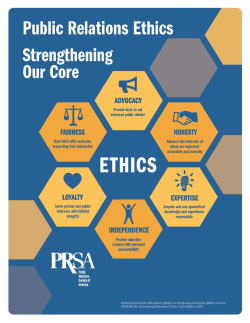The Public Relations Blog
We frequently blog about the latest public relations corporation communications, and marketing topics, tips, and trends. Our blog is one of the 100 Best Public Relations Blogs, according to FeedSpot. Please help yourself to our insights and be sure to subscribe to our weekly blog notifications.
Recent Posts:
With the large number of brands available to an even larger number of people, you have to find a way to reach your potential customers. The best way to do this is to create a list of SEO keywords for your company.
SEO keywords are words or phrases that consumers type in a browser to find what they are looking for. You want to associate the phrases your target audience is using with your company or website. But to find the best keywords for your company, you must first conduct keyword research.
Read More
Topics: SEO, owned media, web media
As marketing, PR, and communications professionals, you may need to download something from the internet, such as a how-to inbound marketing guide, a webinar, an image, or an app.
Read More
Topics: cybersecurity
Vishing is another term for voice phishing, and it is the fraudulent practice of making phone calls or leaving voice messages impersonating reputable companies to convince individuals to reveal personal information, such as bank details and credit card numbers.
Read More
Topics: cybersecurity
Removable media is any type of storage device you can remove from a computer while the system is running. As marketing, public relations, and communications employees, the amount of files you have on your computer probably exceeds the amount of storage available. To store this excess data, you use a removable media device, such as a flash drive, SD card, or other hard drive.
Read More
Topics: cybersecurity
The PRSA Code of Ethics is a set of guidelines that helps public relations professionals “navigate ethical principles and applications and is widely regarded as the industry standard,” according to the PRSA student society.
These principles include advocacy, honesty, expertise, independence, loyalty, and fairness. You can establish these principles throughout your organization, too, which will build a better relationship between you, your clientele, and your employees.
Read More
As marketing, PR, and communications employees, you use email constantly. This means you are vulnerable to the estimated 94% of ransomware that arrives via email, according to CSO Online. Ransomware is malware that encrypts your files, making any other files and systems that depend on them unstable.
You likely use email to send and receive sensitive company information. To protect this data, you need to protect yourself from fraudulent messages and scams.
Read More
Topics: cybersecurity
Nearly all marketing, PR, and corporate communications employees use a laptop for work. According to a survey by tech company Kensington, 10% of laptops get stolen in their lifetimes. And since nearly half of all laptop thefts occur in offices or classrooms, employees who work from laptops at the office must be especially weary.
Read More
Topics: cybersecurity
Something PR professionals and social media have in common is they are both based on communication. However, social media has grown tremendously since it was first introduced because of its ability to connect people with information quickly. While the speed at which social media can produce a message can cause harm, it can also benefit PR with its “real-time messaging.” This can amplify the results of news/press releases, emails, blog posts, and other PR means. In an instant, social media can show a larger audience the content you create while also helping it last longer.
Read More
Topics: owned media, social media
Emails lead to 91% of all cyberattacks — the same email where you may send personal information, such as your W2s, bank routing number, or social security number. Unencrypted emails can also expose confidential information about your company, such as its strategy plans and financial performance. So, before you hit “send” on that email, remember the following rules of thumb for protecting your sensitive information.
Read More
Topics: cybersecurity
Around 25% of corporate employees reuse passwords for all of their devices, logins, or accounts. Employees in corporate communications tend to use multiple websites and programs that require a password. While you might justify using the same password for those sites by saying it's better than forgetting them, thinking that way can compromise your personal and professional information.
Read More
Topics: online public relations, cybersecurity












Comment on This Article